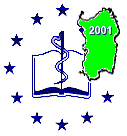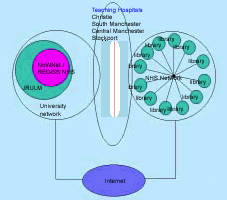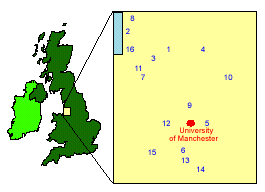 |
Making connections between the University and the NHS: the NoWNet / REGiSS-NHS Liaison Officer project. Angie Ryan, Norma Blackburn*, Valerie
Ferguson, Alastair Flett, Diana Leitch, Alan Neville, Lesley Spellman,
Katy Woolfenden
|
|||||||||
|
Click here to see the poster in pdf format |
|
|||||||||
 |
Abstract
Building on an existing contract
with the Postgraduate Dean for the John Rylands University Library of Manchester
(JRULM) to provide operational and advisory services to postgraduate centre
librarians and doctors in training in the NHS, the NoWNET project was launched
in 1994 to provide the infrastructure to make access at clinical sites
to a range of databases licensed to the JRULM possible. Considerable upgrading,
including sharing the costs of a 2MB link from the University to some NHS
sites, was required before phase 2 (1997-1999) could take place. A range
of SilverPlatter health related databases mounted on REGiSS (formerly Rybase),
the JRULM s electronic gateway, was made available to sixteen trusts on
twenty clinical sites around the region to improve and encourage access
for University staff and students. Particular attention was focussed on
EMBASE, and a deal was also struck to make this database freely available
to all NHS staff as well as members of the University of Manchester. It
soon became clear that a full time member of staff was required to provide
the level of service and support that the JRULM wished to offer.
The project In 1999 joint funding between the JRULM and the North West Region enabled the appointment of a Liaison Officer (Angie Ryan) for one year to address barriers to access and use of the
databases such as:
The clinical sites
The action plan A four pronged plan was designed
to tackle these issues:
Results By the end of the funded NoWNet / REGiSS NHS project the project team had taken ad- vantage of technical solutions such as the widescale ATHENS rollout in both the UK Higher Education and NHS sectors, and the use of Manchester Computing Dial-Up ac- counts to achieve more than the initial stated aim of the project. By January 2001 numer- ous databases were available including:
a - an increase of almost 200% in NHS sites connected to NoWNet / REGiSS NHS
b - double the number of PCs attached to the networks
c - An increase in the use of Embase. 83% of libraries were using Embase by the end of the project compared to 50% at the beginning The twelve month long NoWNet / REGiSS NHS Liaison Officer Project demonstrated a number of things: |
|||||||||
|
|
|
|||||||||



